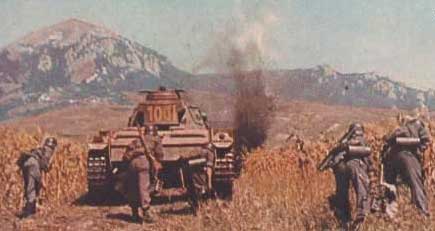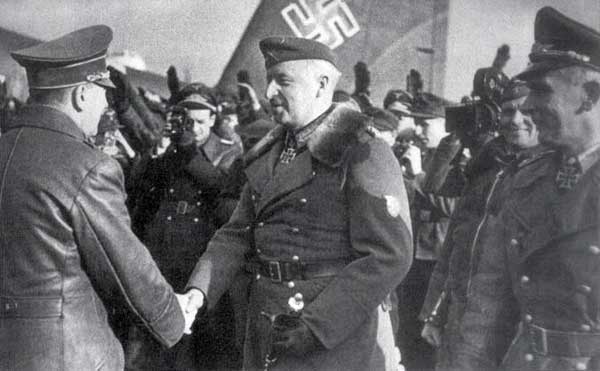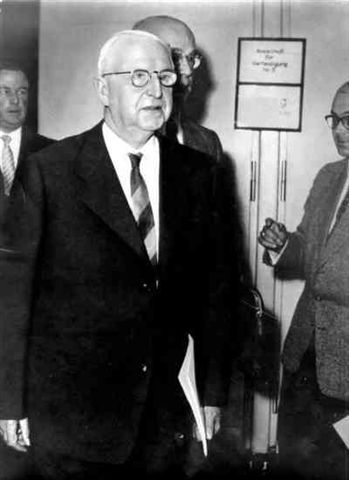|
Erich von Manstein. ( 1887- 1973 )
Erich took his name, to become Fritz Erich von Lewinski gennant von Manstein, which was shortened to Erich von Manstein. Given that both his natural and step father were Generals it may well have been expected that young Erich would walk in their footsteps to serve in the Army. The German Army calls. To earn his General Staff credentials he attended the War Academy over 1913-1914, and when WW1 erupted was a First Lieutenant and Adjutant with the 2nd. Guards Reserve Regiment. WW1. Post WW1. He held down a number of staff appointments broken up by three years as an infantry company commander over 1921-1924, and a year in command of an infantry battalion in 1931-1932. His full Colonency came in 1933, and in early 1934 he became Chief of Staff of Wehrkreis 111 in Berlin. The next year he was appointed Chief of the Operations Branch of the General Staff, Erich was certainly on his way UP. On October 1st. 1936 he made Major General, and General Beck appointed him Deputy Chief of the General Staff. Trouble with the Nazis. The furious Reichenau showed this letter to Blomberg, whereby Manstein was calling Blomberg a coward. In turn, Blomberg called the C-in -C of the Army General Fritsch, demanding he discipline Manstein, Fritsch was unimpressed, telling Blomberg that Army disciplinary affairs were none of his business, and he did nothing to Manstein. Perhaps the doughty Fritsch privately agreed with Manstein. In 1938 Hitler and Brauchitsch met, and the latter took over from Fritsch, and Manstein was relieved of his staff appointment and virtually sent into exile as the Commander of the 18th. Infantry Division at Leipzig. But no doubt his brilliance could not be ignored for too long, and he became Chief of Staff of Leeb's 12th. Army for the invasion of Czechoslovakia in September of 1938. Promotion. The Fall of France 1940. Promoted General of Infantry.
Into Russia. He rescued the German X Corps, then brilliantly destroyed the Soviet 34th. Army near Demyansk. Now a 1,000 miles to the south, on September 12th, Colonel General Ritter Eugen von Schobert was aloft in a Storch reconnaissance plane, directing his 11th. Army thrust on the Perekop Isthmus, at the northern approach to the Crimea, the engine cut out, on trying an emergency landing, the pilot put down into a Russian minefield, both the General and his pilot died. Command of 11th. Army. He quickly assessed that he did not have the strength to achieve both objectives, so decided that he would attack the Crimea first up, from here Stalin could bomb the Rumanian oil fields and also threaten the deep right flank of Army Group South. On September 24th. 1941, Manstein attacked south into the Perekop using General Eric Hansen's LIV Corps, and General Ludwig Kuebler and his XLIX Mountain Corps held in reserve, so that if a breakthrough happened they could drive to the Red Naval fortress of Sevastopol on the south west corner of the Peninsula. To guard his eastern flank, Manstein had to depend on General Hans von Salmuth's XXX Corps, and six not too reliable brigades from Roumania. Some bitter fighting took place against six Soviet Divisions, but Hansen's forces pushed ahead to storm the Perekop on September 28th. 10,000 prisoners, 112 tanks and 135 guns were the booty. However this victory was unable to be exploited, as the Russians now attacked Manstein's eastern flank with two armies on September 26th. Although XXX Corps held firm, the Roumanians collapsed, and Manstein was forced to plug the gap by rushing Kuebler's Corps to the Nogay Steppe. The Russians had saved the Crimea, but were vulnerable on their right flank to Kleist's 1st. Panzers in the north, combining with Manstein's forces, they closed the ring of encirclement on the Sea of Azov, and over October 5-10 destroyed the Soviet 18th. Army, its commander dead. The Soviet 9th. Army defeated, 65,000 prisoners captured together with a large number of both tanks and guns. A notable victory, but it came at a price, the Russians granted three weeks grace to reinforce Sevastopol plus the Crimea area. Battle for Sevastopol. The fight waged over ten days, then the Russians retreated, to be chased by the German troops, who took 100,000 prisoners, 700 guns and 160 tanks, but the prize of Sevastopol held out and was not taken. For 247 days the city resisted the invaders, although the Balaklava Hills were taken on October 30th. On December 17th. Manstein launched an assault that he thought would carry the day, but the Russians now mounted an assault on the Kerch peninsula from seawards, forcing Manstein to respond there and call off the move on Sevastopol. A stalemate ensued now until the end of that Russian winter. Manstein now made a Colonel General. Attack by Manstein against the Soviet line between the Kersh bridgehead and Sevastopol. Having secured his rear, Manstein could at last turn to the task of grabbing Sevastopol. Attack on Sevastopol. It took a month before the city fell on July 3rd. another two Soviet armies virtually liquidated, 90,000 prisoners and a massive number of guns, tanks, mortars and aircraft take. The number of Russian prisoners now in German hands must have posed huge logistic problems for Manstein. To the top of the Army promotion tree. Hitler diverts 11th. Army to the Leningrad fight. But no! the Fuehrer was intent on the capture of Leningrad, and the 11th. Army was sent off to join up with Army Group North, Manstein however was not so sure that the city would capitulate. Scheduling the attack for September 14th. it was forestalled by the Soviets moving against the southern flank of Colonel General Georg Lindemann's 18th. Army, and Manstein's forces were sent off to assist the threatened sector. Once again our new Field Marshal was up to the task, and he decimated Russian forces to take prisoners and a quantity of hardware.
Loss of Manstein's son. Back at the front. His HQ designated Army Don Group was given the unenviable job of rescuing 6th. Army, and on the Eastern front restoring its southern sector. The Field Marshal was about to face a very demanding and critical area of his whole career. He believed that the 6th. Army should be allowed to break out , but as usual Hitler would not agree, his tasks were threefold:
Each of these individual tasks were in themselves a big project, and he faced some ten Soviet combined arms armies, a large Russian air command, tanks, and other assorted regiments, in all, a huge enemy build up. Manstein did a great job, stopping the Russians at Rostov, holding his front intact, but Paulus refused to break out at Stalingrad, Hitler did not give him orders to try and break through the Soviet encirclement, and the 6th. Army ceased to exist. Holding at Rostov became the key, had Stalin's forces reached that city they would have cut off some 900,000 German troops, but Manstein stopped the Russians only 20 miles away from the city. Kharkov. Awarded the Oak Leaves to the Knight's Cross. A huge bulge. As so often happened, Hitler vacillated and delayed the offensive for two months to July. The result was a German defeat after the greatest tank battle in history, the Russians broke through the southern flank of Army Group Centre and headed West, the end result, it was the final German major offensive in the East. For Manstein all roads now led back West towards Germany, he was totally outnumbered, in the order of six to one. He was forced to fall back, firstly to the Mius, the Donets and finally to the Dnieper. Loss of Kharkov. Attitude to Jews. Dnieper Line. On January 4th. 1944, Manstein flew off to petition Hitler at Rastenburg, that he be allowed to pull back his entire Southern wing, but Hitler always impossible when asked permission to withdraw, refused. He also demanded a C-in-C East, ie., himself be appointed, but that also was brushed aside by Hitler. Now XLII and XI corps of the 8th. Army were surrounded near Cherassy, their commander ordered by Hitler to hold, rather than try to break out. All the Eastern Command generals were brought to Posen on January 27th. for a two day talk fest by Goebbels, Rosenberg and others, then off to Rastenburg for a gee up by Hitler on the duties of Officers. In the midst of this performance Manstein interupted with : And so it shall be Mien Fuehrer! " After it was all over, Hitler told Manstein never to interupt him in the middle of a speech again. In an attempt to relieve segments of the 8th. Army, Manstein got as close as 5 miles, then he told their commander General Stemmermann his force would have to make these last 5 miles on their own, on the night of February 16/17 they broke through, but lost all their tanks, artillery and heavy equipment, and General Stemmermann was killed. Of the original force of 54,000 men, 30,000 escaped. Manstein again petitions Hitler. Within four days 1st. Panzer Army was surrounded on the Bug, once more Hitler uttered the usual refrain " No retreat." Manstein protested with vigour, without result. On March 25th, after a series of heated phone calls, the Field Marshal was summoned to the Berghof, where he threatened to resign, Hitler at long last backed down and agreed to a breakout. Hube saved 10 Divisions, breaking out to reach the German lines on April 6th. but Manstein was gone. Manstein and Kleist relieved of commands. Field Marshal Walter Model was Manstein's replacement. It is reported that Hitler gave a large estate to FM Manstein that autumn. Manstein captured by the British.
In August 1952 he was released on Medical parole, then finally released in May of 1953, to be a Military advisor for the Western German Army. He wrote the book " Verlorene Siege ( Lost Victories ) and died at Irschenhausen, Bavaria on June 12th. 1973, he was aged 85.
Conclusion.
See the Index to "Adolf Hitler and his WW2 Field Marshals" |

 He was born Fritz Erich von Lewinski on November 24th. in 1887 in Berlin. His father was General of Artillery, Eduard von Lewinski, and the family roots went way back to the Teutonic Knights. The new son was the 10th. child, and Frau Lewinski's sister remained childless, so arrangements were made for her to adopt Erich, his step father, Lieutenant General Manstein, a Divisional Commander in the Kaiser's Army.
He was born Fritz Erich von Lewinski on November 24th. in 1887 in Berlin. His father was General of Artillery, Eduard von Lewinski, and the family roots went way back to the Teutonic Knights. The new son was the 10th. child, and Frau Lewinski's sister remained childless, so arrangements were made for her to adopt Erich, his step father, Lieutenant General Manstein, a Divisional Commander in the Kaiser's Army.


